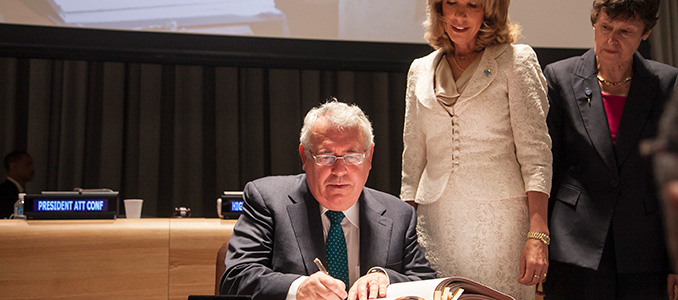Ireland signs the Arms Trade Treaty
In June 2013, Ireland signed the Arms Trade Treaty in New York. This followed a decade of efforts to bring regulation to the global trade in conventional arms.
On 3 June 2013, Ireland joined sixty-six other countries at the UN in New York to sign the Arms Trade Treaty (ATT). After over a decade of concerted efforts by countries and civil society, this landmark treaty represents the first legally binding instrument to regulate the global trade in conventional arms. As UN Secretary-General Ban Ki-moon put it, ‘the world has finally put an end to the ‘free-for-all’ nature of international weapons transfers.’ As a sign of our strong support, Minister Joe Costello signed the ATT for Ireland.
The unregulated flow of arms has exacerbated regional conflicts, exacted a heavy toll in human suffering, and deflected resources away from sustainable development. The ATT will enable the international community to curb these consequences. This is why Ireland has argued for a strong and robust ATT from the very beginning, working with other countries and with civil society, to achieve that goal.
Ireland has argued for a strong and robust ATT from the very beginning, working with other countries and with civil society to achieve that goal.
The new Treaty prohibits a State from authorising arms exports where it has knowledge that the weapons will be used in the commission of genocide, crimes against humanity, grave breaches of the Geneva Conventions of 1949 or other war crimes. It will also oblige States to minimise the risk that weapons would be diverted into the wrong hands or to the illicit market, and to adhere to robust, comprehensive and legally-binding standards.
In the Tánaiste’s words, ‘the ATT is an example of how the UN can deliver and make a contribution to international peace and security. I encourage all UN Member States to ratify it so that it can enter into force and begin saving lives.’
The ATT will enter into force when fifty countries have ratified it. Ireland is working with others to secure early ratification and implementation of the Treaty. This will require continued engagement as well as capacity-building and knowledge-sharing on the ground. The world has waited a long time for the ATT; getting it working it will remain a priority for Ireland.
Other Features
Read other features on the work we do at home and abroad.

